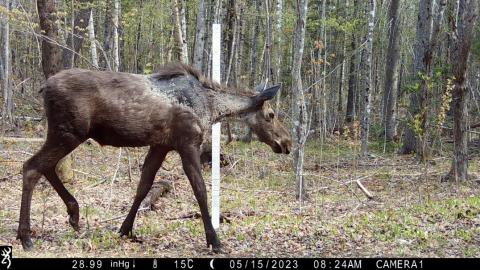Monitoring Moose and Other Culturally Important Wildlife on Penobscot Indian Nation Lands Using Remote Cameras

Moose and other wildlife are culturally important and a source of food for the Penobscot Indian Nation (PIN). However, recent declines in regional populations due to winter ticks have caused concern among the Tribe. In response to these threats, the PIN has implemented aerial surveys to estimate moose populations. However, aerial surveys are costly and not a viable long-term monitoring solution.
Remote cameras are a cost-effective and robust method for monitoring moose and other wildlife species in the region. They provide abundant data and can be used to engage tribal members with wildlife on PIN lands. NSRC researchers will develop a multi-species monitoring program using remote cameras to track populations trends of moose and other wildlife species found on PIN lands.
An equally important goal is to engage tribal members, especially youth, with wildlife on PIN lands. The need to identify or tag wildlife species captured using remote cameras creates an opportunity to engage tribal members as image taggers. This project will help PIN sustain healthy populations of wildlife to protect cultural traditions and serve as an educational tool to engage tribal members and preserve Penobscot culture.
